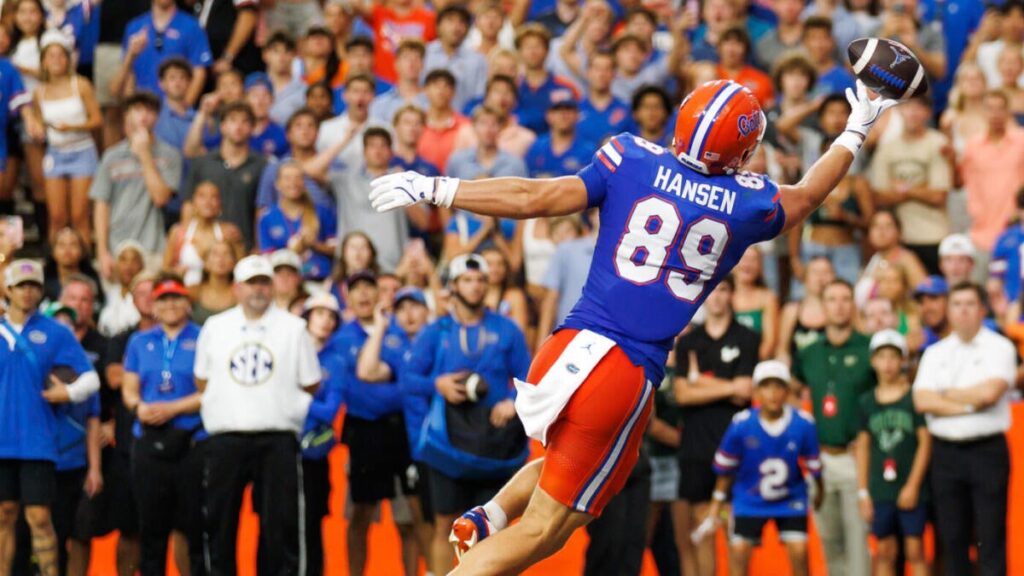The AP Top 25 Poll may not matter as much as it used to, but it still plays a vital role in establishing narratives and perception around certain teams until the first College Football Playoff rankings are revealed in early November.
That’s why there was collective outrage this week when an AP voter moved Florida up two spots to No. 14 and left South Florida unranked after the Bulls improved to 2-0 with a road victory over the Gators.
It was a cringeworthy ballot that appears to have sent long-simmering frustration with the AP voting system into overdrive. Much of the wrath is being directed at the guilty voter, who probably would love a redo. But all the energy being spent railing on one person’s mistake or lapse in judgment would be better spent calling for fixes to the system itself.
Everything else is changing in college sports. Why can’t the AP voting criteria? For too long, voters have treated their ballots like projections, offering grace to big brands with big expectations rather than permitting on-field results to dictate the early-season hierarchy.
Ballots should be ripped up and recalibrated after Week 1 and again after Week 2 as results flood in. Instead, certain programs are offered benefit of the doubt while others must struggle for respect.
That issue could be snuffed out with a clear, results-oriented voting rubric communicated to voters ahead of Week 1 in 2026. The result would be more meritocracy in college football and less brand bias.
If a team wearing Michigan uniforms had beaten Boise State and Florida, it would be ranked higher than No. 18 this week, which is where South Florida landed.
USF’s detractors will ask, “yeah but what if the Bulls go out and get slaughtered by Miami on Saturday?” If that happens, drop them accordingly (though you can argue wins over Boise State and Florida would still make South Florida a top 25 team).
Feeling Bullish: How South Florida persevered through heartbreak, emerged as darling of college football
Brandon Marcello
Strip away the logos, go with blind resumes and let the results dictate the ballots instead of assumptions. Providing clear direction for what voters should value in the balloting process — with a heavy emphasis on results over projections — would also make the task easier.
You might snicker at the suggestion that any simplification is needed. After all, how hard can it be to accurately rank 25 teams once a week?
Well, the AP voting system has long-valued geographic diversity and a depth of opinions in its voter pool. Thus, it incorporates dozens of beat writers, local TV news reporters and a handful of national personalities from around the country.
There is nobility in that rationale.
But accurately ranking 25 teams before the coffee is done brewing on Sunday morning is difficult when you’ve spent all day engrossed in the one team you actually get paid to cover. That’s especially true without a clear directive on how to rank them.
A beat writer who lives 30 minutes from the stadium might leave home around 12:30 p.m. ET on Saturday if they are covering a 3:30 p.m. game. If they’re lucky, they’ll get home by the two-minute warning of the evening games. And they don’t even get to watch those two minutes because the dog needs to pee.
Now, let’s say it’s a road game. If it’s an afternoon kick three hours away, you may be doing both legs of the drive on game day. In that case, you’re leaving around 9 a.m. and getting back around 1:30 a.m.
When you’ve spent all Saturday devoted to dissecting the performance of a single team, it’s tough to accurately dissect the performance of 30-40 others by Sunday morning.
This isn’t intended as a shot at the AP voters, many of whom are great at their actual jobs and have also developed their own well-reasoned and consistent rankings rationale.
But from experience, it’s a challenge. In fact, I made my now-colleague Gary Parrish’s “poll attacks” column in November of 2017 for filing a poor AP Top 25 college basketball ballot in one of my first weeks as a pollster.
It was an honor to be tabbed as an AP basketball voter, and I intended to take the responsibility seriously. But my job was to cover University of Tennessee athletics for the Chattanooga Times Free Press.
At the time, I was up to my eyeballs in Tennessee’s infamous 2017 football coaching search, in addition to covering Vols basketball, a top-15 Lady Vols program and the remnants of a woebegone football season.
Amidst the mayhem, I was unable to devote proper attention to college basketball’s national landscape. It got me blasted by Gary, and deservedly so. I should have been honest with myself and with the AP and recused myself from voting rather than submitting a shoddy ballot.
Perhaps there are some voters who should self-assess and admit that they don’t have to bandwidth to file good ballots. With everything that’s asked of local reporters in an era of diminished budgets, there’s no shame in scaling back on duties non-essential to your paycheck.
Alternatively, the AP could be more selective with whom it gives a ballot.
The AP poll still matters. If it didn’t, no one would care where South Florida is ranked this week or who was stubborn enough to keep the Gators on their ballot.
Let’s make it better.
Read the full article here


